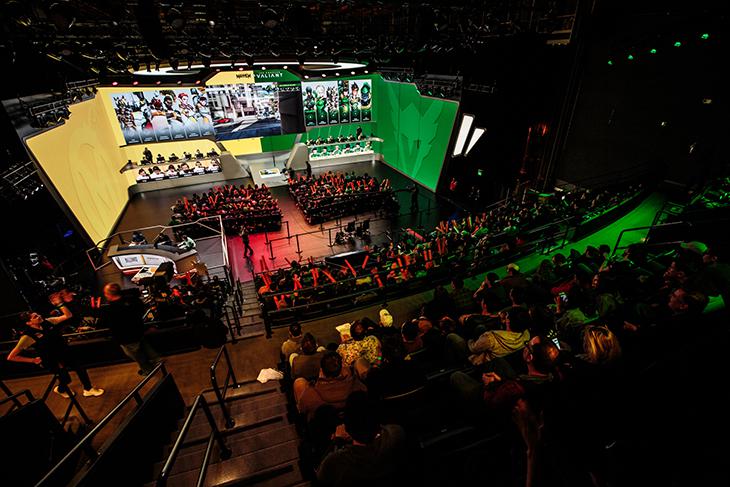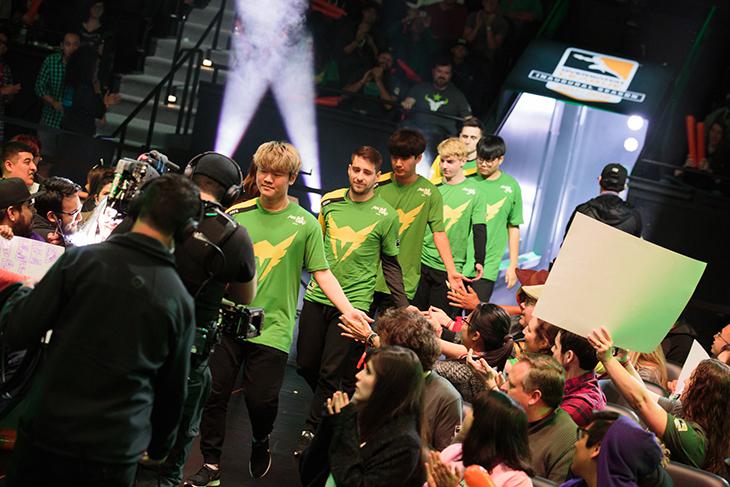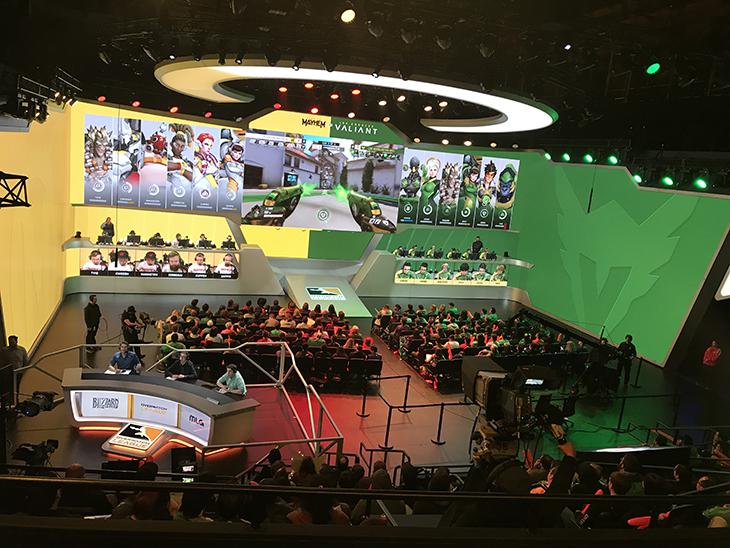A group of middle school boys, decked out in green team jerseys and waving their orange foam sticks, celebrated a friend’s birthday at the Overwatch League match between the LA Valiant and Florida Mayhem e-sports teams on Thursday, March 15.
“Valiant! Valiant!” they cried from the top of the stands, as a stadium camera zoomed in and the other fans in the packed stands clapped and smiled.
They represented some of the youngest members attending the match at Burbank’s Blizzard Arena, a roughly 450-seat, 50,000-square-foot facility in the former home of The Tonight Show, that opened in January.
The space officially connects the online gaming community with a live-event experience similar to traditional professional sports leagues, as the e-sports industry stands poised to skyrocket.
Revenue is expected to hit $905 million in 2018, up nearly 40 percent from $655 million in 2017, according market researcher Newzoo. It could reach $1.1 billion by 2019.
RELATED: E-Sports Is Not Just For Nerdy Guys Any More
Data Matters in E-Sports, but Metrics Remain Limited
“An overnight success many years in the making,” quipped Ari Segal, president and COO of LA Valiant and Immortals, another e-sports team.
He believes the tipping point came when Robert Kraft, owner of the New England Patriots football team, and Jeff Wilpon, owner of the New York Mets baseball team, invested in the creation of the Overwatch League.
“These professional, traditional sports teams owners validated it’s worth their time and treasure,” Segal said.
While e-sports have proven they can sell out the Madison Square Garden, the Staples Center, and arenas around the world, the industry has only entered the mainstream, cultural zeitgeist within the last year. Segal envisions that eventually, calling up some friends to go to an e-sports match will be as commonplace as scoring tickets to a Lakers game, but right now, “it doesn’t have half a century of familiarity.”
There’s some work to do.
Building Fan Loyalty
“The cool thing about e-sports is its community is immediate and global,” said Segal.
Fans can consume it live or on-demand, for free, anytime during the day, anywhere in the world.
“If I want to watch a New York Giants game right now, I can’t,” he said.
But what the New York Giants do have—along with many other sports leagues—is fan loyalty tied to location, and that’s what Segal and the Overwatch League plan to build.
The Valiant team is targeting the larger Los Angeles market with a fan-focused event series, “Be Valiant,” that encourages locals to “come engage in a tangible way” with activities that are geared toward niche gaming markets and thus promote the organization’s values of inclusivity, diversity and creating a sense of belonging.
“‘Be Valiant’ is intended to accomplish at least three objectives,” Segal said in a press release. “First, we don’t need to wait for folks to find us; instead, we’re going to take our brand and team to them directly. Second, it enables us to efficiently deliver programming and experiences designed to connect to specific audience segments. Third, it amplifies the message we’ve tried to deliver to Los Angeles and our great fans through the first two stages of Overwatch League: being a fan of the LA Valiant is about being part of the LA Valiant fan community; it’s a participatory experience.”

LA Valiant also actively shares those events live across social media, which has been a significant tactic for gaining new followers.
“As we show images of people engaging and participating, that resonates with the fan that was marginal,” Segal said.
The Next Stage for E-Sports
One of the reasons the e-sports market is expected to grow every year is because it targets 18-34-year-olds, and attracts even younger gamers—like the boys having a LA Valiant birthday party—so there’s a constant wave of new fans. At the same time, metrics have shown that people don’t age out of e-sports as they get older.
“Demographics drive growth as much as anything,” Segal said.
The desire to capture e-sport’s millennial audience and strong social following has traditional sports brands considering e-versions of their own leagues—a move that’s being pioneered by the NBA, which just launched a league around its NBA 2K video game.
RELATED: SXSW 2018: Why Traditional Sports Are Eyeing E-Versions
However, Segal doesn’t see that as a feasible direction for the future of e-sports. As much as traditional sports teams are hoping to profit from this new business model, “I don’t think merging is going to happen,” says Segal. “A big portion of these gamers are a different group than sports fans.”
Instead, Segal thinks the future of e-sports lies in advances in mobile technology to create games with engaging content, making e-sports even more accessible to fans on the go.
“We think mobile,” he said, “is poised for massive growth.”













































__twocolumncontent.jpg)















